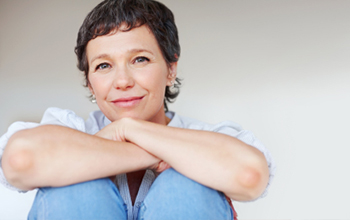
Annual Exams
There is often confusion about annual exams because to most women an annual exam refers to having a Pap smear. A Pap smear is simply a sampling of cells from the cervix or opening to the womb to detect women at risk for cervical cancer. It does not necessarily test for infections, bleeding issues or ovary problems. The American College of Obstetricians recommends starting Pap smears at age 21. They also recommend breast exams every one to three years after age 20. At a typical annual exam, other important issues – such as infection testing, intercourse problems, urinary troubles, blood pressure, diet and exercise, and family planning – are addressed. Thus, it is important for most women to see their gynecologist once a year starting about age 20, sooner if sexually active or having period problems.

Premenstrual Syndrome
Premenstrual syndrome (PMS) affects up to 40 percent of women, and up to 5 percent of these women have severe symptoms that affect their ability to function daily. PMS includes many symptoms both mental (mood irritability and depression) and physical (breast tenderness, bloating, fatigue and headaches). In order to confirm a PMS diagnosis, these symptoms have to occur month after month; the symptoms also need to go away within a few days of starting the period. In general, the symptoms should not be present within a few days of starting the period through about two weeks before the next period. Many women see the doctor for PMS, when really they suffer from depression or anxiety, which may be made worse around the menses. A more severe form of PMS is premenstrual dysphoric disorder (PMDD). At least five symptoms are present with PMDD, and the mood symptoms dominate.
Fortunately, there are effective treatments for PMS. Exercise and relaxation exercises have proven to be helpful. Vitamin and mineral supplements such as vitamin B6, magnesium, and calcium may also relieve symptoms. If breast discomfort is a major symptom, caffeine reduction and evening primrose oil (an herbal remedy) are an option. Another herbal product, chaste berry root, also has been used with some success. An antidepressant is sometimes another treatment option, however, many women are nervous about trying an antidepressant prescription to treat PMS. Just because the medicine is called an “antidepressant” does not mean it is being used for depression. When you treat depression, you need to continuously take these medications for four to six weeks to see a benefit. In treating PMS, it is interesting that you can often take the antidepressant just two weeks before the period through the first few days of the period and see results. Also, very low doses often work well, whereas higher doses are needed for depression.
Heavy Menstrual Bleeding
The big question is: what is heavy menstrual bleeding? Some women change two pads a day for three days and think they have heavy periods. Others bleed for 10 days and stay home from work because they are changing a pad every hour. A typical menses should last up to seven to eight days and happen no sooner than every 21 days from the first day of the one period to the first day of another period. Generally, if your cycles last longer than seven to eight days, or if your bleeding is so heavy that you have to change saturated tampons or pads sooner than hourly, you have heavy periods. Also, if you are often lightheaded or cold, you may have anemia from the blood loss. Keep in mind that a lot of the “blood” seen also includes tissue and water.
Fortunately, there are many options for heavy menses. The first step in helping your periods is to find out why they are abnormally heavy. Your doctor cannot best identify your options if he or she does not know the cause. Other factors that affect treatment include your age and fertility desires. In addition, certain medical problems – such as thyroid disease and bleeding disorders – may affect that affect periods.
Treatment options include over-the-counter medications like ibuprofen (such as Advil or Motrin). While often times ibuprofen is thought of as a “blood thinner,” for menstruation it can actually lower the amount of bleeding if taken just before the period starts and into the first few days of the period. A number of medications that offer hormone treatment can be used to help menstrual bleeding. Sometimes if the heavy bleeding is due to not ovulating or producing an egg each month, certain medications can help with regulating the cycle.
For patients who cannot take medicines for many different reasons, surgical options can be helpful. Fortunately there are minor procedures like endometrial ablation for those who have completed fertility and fall into the right age group. There are also radiology procedures called uterine artery embolization that reduce the blood supply to the uterus. Finally, for patients who do choose to have a hysterectomy, many new minimally invasive surgery options are now available.

Fertility
With many women delaying childbearing until after 30 years of age, fertility is a big concern. Then, when the time comes to try to conceive, they realize many issues are involved. The chance of getting pregnant with each menstrual cycle is 20-25 percent. However, after age 35 the likelihood drops to about 10 percent. Of course, these fertility rates are for just one cycle. Most women will become pregnant after one year of trying. Women who do not conceive after one year should definitely seek fertility help. Those over age 35 who do not conceive after six months should also consider seeking medical advise.
It is important to be taking a form of folic acid either alone or in a prenatal vitamin while trying to get pregnant. Folic acid helps prevent birth defects and is important to take before conception. It is also important not to wait until pregnancy occurs to avoid excess caffeine, alcohol and processed foods. Being overweight increases the risk of miscarriage, high blood pressure, diabetes, and cesarean section with pregnancy. Therefore it is critical to eat well and exercise before pregnancy.
There are many possible causes that may contribute to a woman’s difficulties in conceiving. Often times both husband and wife have a small problem that, when they come together as a couple, creates a big problem. Regardless, a fertility evaluation should involve both spouses.
Family Planning
Some patients choose natural family planning, a method that helps patients avoid intercourse around ovulation time. A good resource for this method is www.natural-family-planning.info.

Healthy Diet and Exercise
You are now entering the phase of your life where you cannot count on childhood metabolism to keep weight off. It is also important to have a healthful diet to prevent diseases. Maintaining or losing body weight requires a healthful diet and exercise. The keys to ensuring exercise success include: working out first thing in the morning, working out with a buddy (so it is also social), and exercising outside of your home (because you can always find something more important to do at home). Most adults should get 30 to 60 minutes of exercise every day. Other benefits of exercise include a reduction in stress and anxiety.
Your diet should include both complex carbohydrates and protein at every meal, and five servings of fruit and/or vegetables daily. You should avoid simple carbohydrates, such as refined sugar, corn syrup and pasta, and processed foods. Focus your shopping on the periphery of the grocery store – your cart should be full of fresh fruit and vegetables, lean meat, and dairy. Yogurt is a healthy food, but seek out plain yogurt and add your own sweetener like a small amount of agave or honey in order to control how much sugar is added. A wonderful resource for healthful cooking and eating is www.cleaneatingmag.com.